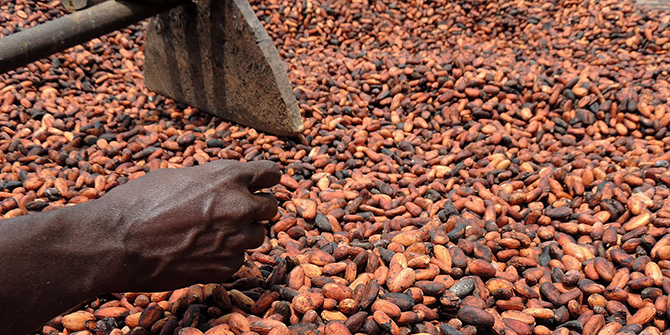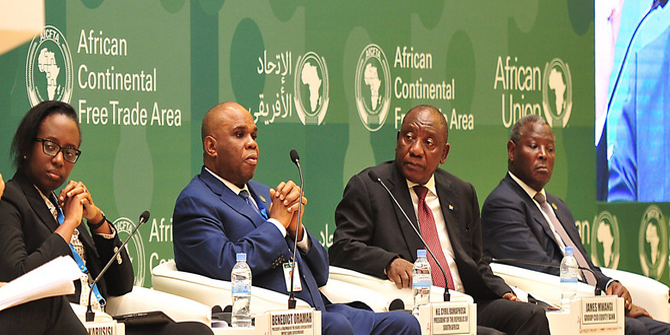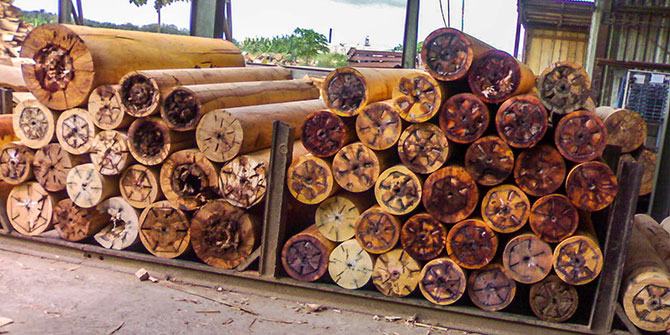“Gambling”, “bets”, and “deals” are not the usual diction of a development economist, especially not a UK bureaucrat. And yet they are at the core of the argument in Stefan Dercon’s recent book: Gambling on Development. We don’t intend to review it here as others have done so elsewhere (the FT’s David Pilling, LSE’s Duncan Green, Stephen Williams in African Business, CGD’s Ranil Dissanayake or Simon Maxwell). We focus on how Dercon’s thinking applies to African economic integration, and what someone like Wamkele Mene, the Secretary General of the African Continental Free Trade Area (AfCFTA), and his partners, might use from it.
The book’s arguments
The book’s main argument is that growth and development occur where a development bargain has been struck, defined as “a commitment by those with the power to shape politics, the economy, and society, to striving for growth and development.”
To paraphrase, development bargains emerge when the political and economic elites gamble their political and economic power on promoting and implementing policies in pursuit of wider development rather than narrow self-interest. If the bet succeeds, the economic pie grows, and everybody wins. If it fails, they risk losing power.
That means that elites need to be willing to take the gamble. But it is not easy to predict what conditions will lead them to do so, and it is especially difficult to ensure that gambles pay off. As Dercon says, “understanding why the rhetoric was followed by action in some places and not in others is at the centre of understanding how development works.”
While Dercon focuses on national economies, it is even more interesting to analyse whether this concept could be useful at a regional and continental level. How might AfCFTA Secretary General Mene or other regional policymakers use the concept of ‘regional development bargains’ to make the AfCFTA and its benefits a reality?
The following three areas are worth exploring; regional industrialisation, regional trade and transport corridors, and the role of external partners such as the EU in supporting these.
Regional industrialisation bargains
Recent evidence suggests that intra-African trade has a higher share of manufactures than non-African trade and that the past deindustrialisation trend since African independence may have slowly been reversed. This seems to bode well for the AfCFTA ambition of promoting regional value chains (RVCs), while the low starting point lends weight to the argument that industrial policy will be key to AfCFTA’s success.
However, even at a national level, industrial policy success depends on the kinds of elite bargains that Dercon refers to. Actors’ interests must align to address a host of “internal coordination and management issues that are essential for achieving competitiveness.” At a regional level, the complexity rises further, which explains why past regional industrialisation strategies have often struggled to move from policy to practice.
For instance, although the Southern Africa Development Community (SADC) initially sought to become a customs union, the process stalled due to concerns among members that their industrial sectors were ill-prepared to open up trade further. This led them to adopt a regional industrialisation strategy to boost production, with the goal of promoting RVCs. Other regions have done the same, but all with similar outcomes: competition among states trumps cooperation between them, as seen in the regular ‘trade wars’ within the different regional customs unions in East and West Africa.
This would suggest that there needs to be a ‘regional development bargain’ to promote private sector development, investment and job creation, not just within states but also between states. It requires a joint commitment among multiple heads of state “to shape politics, the economy, and society” in the name of regional growth and development through trade and investment. But is this possible?
In a recent speech, Secretary General Mene mentioned the possible need for a new continental industrial policy. This new policy would replace or build on the Accelerated Industrial Development for Africa (AIDA) initiative, which was endorsed by African heads of state in 2008, but has also struggled to gain traction.
It could be that the new focus on continental trade and RVCs merits a renewed strategy to promote investment and coordination in key sectors. Analyses, such as those conducted by UNCTAD and The International Trade Centre (ITC), suggest that RVCs could indeed emerge in important sectors like pharmaceuticals, agro-processing and automobiles.
Here, Secretary General Mene, the AfCFTA state parties and their international partners will need to identify not only the economic viability of promoting intra-African RVCs, as current studies do, but also where an RVC ‘development bargain’ already exists or is emerging and can thus be supported.
Regional corridor bargains
The AfCFTA Secretariat has chosen to work on the Abidjan-Lagos Corridor in West Africa. Back to Dercon: is there a development bargain between the corridor states and indeed the regional organisations such as the Economic Community of West African States (ECOWAS)? Evidence from the Nigerian border closure with Benin, partly related to smuggling but also to industrial protection, suggests there is some distance to go to arrive at an agreed cross-border development bargain.
A corridor approach may offer a way to support trade in a bottom-up, more manageable way, focusing on barriers and specific areas for reform. But they may also require a ‘development bargain’ at different levels of intervention – at the borders themselves, along corridor routes, between high-level politicians, and arguably with the wider regional economic community.
Recent work on the Dakar-Bamako corridor shows that despite high-level political interest and commitment to promoting corridor transport even in 2011, ten years later, strikes were still taking place to complain about the lack of progress in removing the same barriers. Here, the ‘bargain’, if there was one, broke down at the administrative level, where bureaucratic and other economic interests were able to block corridor reforms – ‘profitable inefficiency‘ if you will.
That said, past work on the Beira and Nacala corridors, connecting Malawi to the Mozambican coast, illustrates that even within one country, one corridor (Beira) can have something of a development bargain around it, while another (Nacala) is the source of rent-seeking and political in-fighting.
This suggests that a development bargain could emerge on the Abidjan-Lagos Corridor if the right actors are involved, and incentives align around the need for smoother cross-border conditions.
External supporting bets
The AfCFTA is very much an African agenda, driven by African actors. To his credit, Secretary General Mene has been steering a difficult path between accepting external financial support while keeping a firm grip on the direction of his dossier. Nonetheless, there is a place for external support as agreements with the UK and other international partners attest.
The challenge here, à la Dercon, is that aid should only be used where it somehow supports a development bargain, or helps one to emerge. How will assistance change the odds of success? Will it strengthen those focusing on growth and development, or will it give ammunition to those keen to capture more rents?
The EU is currently programming its funding to support economic integration in Africa through the regional communities, the AfCFTA and a series of corridors. Even if framed as the ‘EU Global Gateway’, it is also framed as supporting the AfCFTA and integration more broadly. Yet it is not clear to what extent they are able to take account of the ideas discussed here. They must also understand contexts and the key actors engaged in order to identify where their aid can help development bargains to emerge around industrialisation, trade and corridors, and where these are happening between and within countries and regions.
Some development actors are arguably already somewhat in the betting game. Organisations such as the multi-donor-funded Trademark East Africa have worked with and through regional politics for many years in East Africa. In West Africa and the Great Lakes, trade facilitation programmes also seek to support trade and traders focused on working within the local, national and regional politics. While not easy and requiring a degree of flexibility and adaptability in programming and implementation, an approach that looks for and works with regional and cross-border political-economic ‘bargains’ signals ‘aid effectiveness.’
Altering the odds?
If indeed development is best seen as a gamble, Secretary General Mene has been given a lot of chips, and people are queuing up to give him more. He, his staff and their regional colleagues will therefore need a clear idea of what games are being played on the different tables. There is a lot of existing knowledge about where power relations lie, and how state-business relations shape sector development in different countries. But bringing these to the fore can be tricky unless done in a more neutral, analytical way.
At the same time, there is a whole range of African and other researchers and think tanks following the AfCFTA processes at all levels, including the related politics. Their analyses might be drawn on to inform and facilitate the process of AfCFTA implementation and external support – to alter the odds of success, so to speak. Though that in itself may be a gamble…
The irony of it all is that the AfCFTA is a bargain by definition – the result of explicit negotiations between states. Even if and when those negotiations are complete, there will still be a lot of betting and gambling to do to get it implemented, before eventually translating it into tangible development.
This article was originally published in Pan African Review.
Photo by Darya Sannikova, obtained from Pexels.





